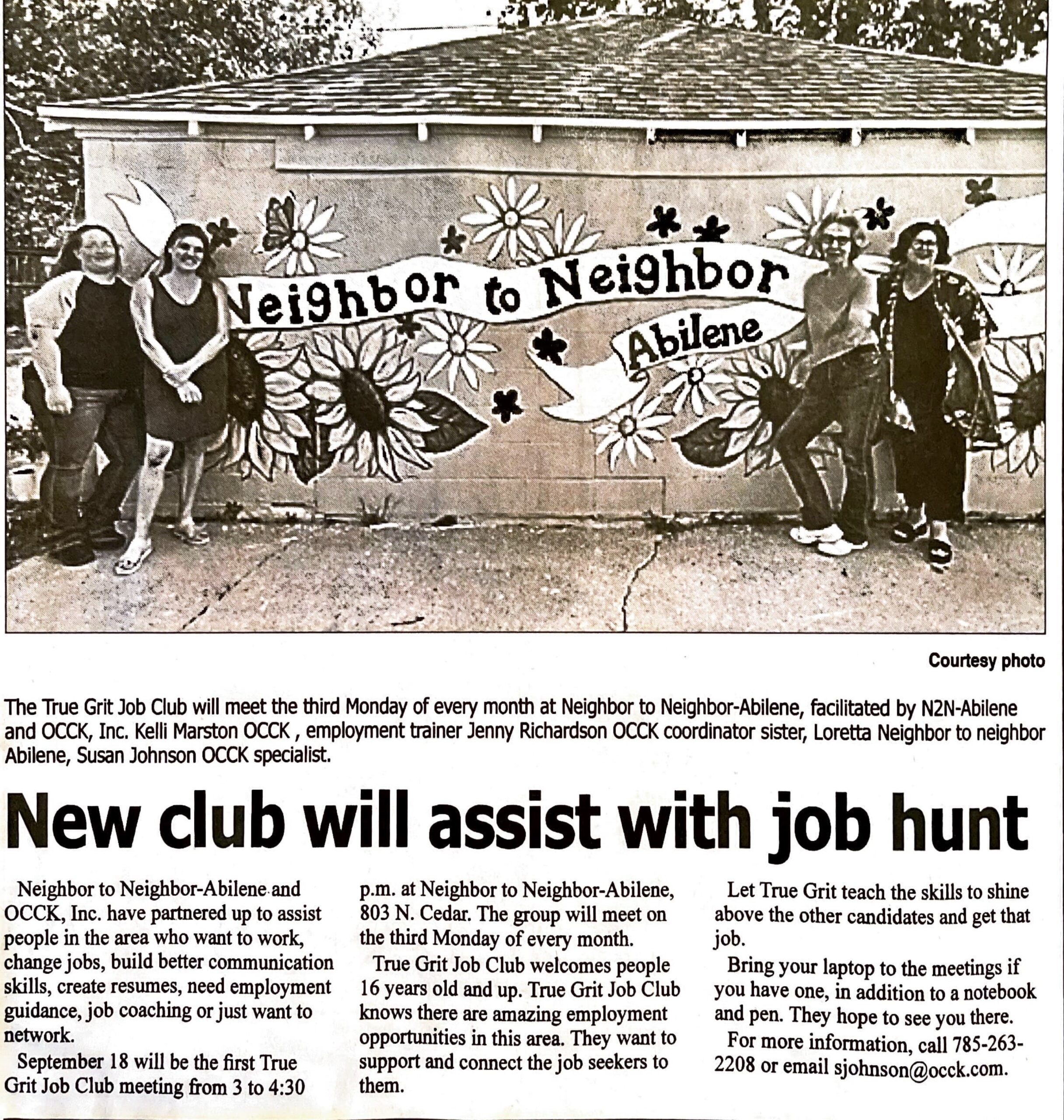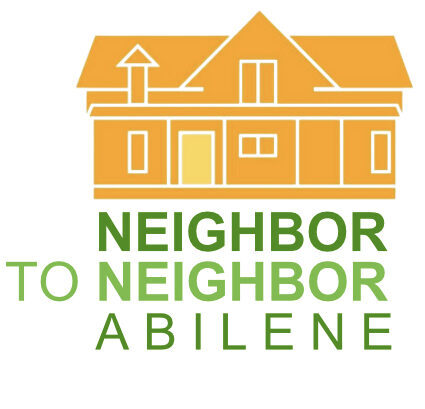Neighbor to Neighbor opens gift shop
Oct 20, 2023, Abilene Reflector
Neighbor to Neighbor Abilene recently opened a gift shop inside their location of 803 N Cedar. The gift shop features various homemade crafts and canned items made by Abilene residents. The gift shop will be open Mondays through Fridays from 9 a.m. to 4 p.m to the public. Payment methods of cash or check will be accepted.
Gift shop vendors are able to bring in the items they created and a Neighbor to Neighbor volunteer puts the items on display. A portion of the proceeds will go back to the creator and the rest will go to Neighbor to Neighbor to be used for operating expenses. If any community members are interested in featuring their craft in the gift shop reach out to Neighbor to Neighbor Abilene for more information.

Drug court’s key to success
By Gail Parsons, June 16, 2023, Abilene Reflector
The model Dickinson County Drug Court operates under has been used across America for decades. But it’s not always successful.
The justice system and addiction treatment professionals who comprise the drug court team said it the reason it is showing signs of success in Dickinson County is because the support it has from the community and the agencies, which were brought to the table.
“We’ve had a drug court before in this district [Eighth Judicial District],” said Judge Ben Sexton. “We had one in Geary County but it failed due to lack of funding and shared miscommunication and ownership by the community partners.”
In Dickinson County, county officials have also jumped on board and have extended any help they can give. Sexton said to have county employees like former county attorney Sarah Ikena and Administrator Janelle Dockendorf at the table adds value to their efforts.
“The buy-in from the county attorney’s office, from law enforcement — it doesn’t even get off the ground if those folks aren’t willing to work with us — to come in here and be a part of this,” Sexton said.
Law enforcement has an important role and a voice at the table. Chrysann Phipps, director of Community Corrections, said without them a large piece of the puzzle would be missing. Among their responsibilities law enforcement will perform curfew checks and help with the daily urine tests.
“Every participant that’s on drug court is placed on a curfew, dependent on their level, and law enforcement will go out — sheriff’s deputies or city (police officers) and do curfew checks for us just as a courtesy,” Phipps said. “There are nights where Jamie [Womochil], the intensive supervision officer or Rona Larson, the drug court coordinator, will go out with them and go check on our drug court participants.”
Having Stephen Kency, the jail supervisor, at the table is also a benefit, she said. Every participant is assigned a color code. Each day they are responsible for calling in and learning what the color of the day it. If it is their color, they have to report in for a urine test, which could be as often as three or four times a week.
“We’re not open on holidays and weekends and so Kency will allow his staff to [administer the urine analysis tests] for us on weekends and holidays,” Phipps said. “Our participants will show up at the jail for their UA and without the support of the sheriff allowing Kency to do that, it would be impossible. Really, they’re getting supervision through the law enforcement assistance 24/7. It’s really a wrap around and it’s not a five-days-a-week, eight-to-five supervision, it is a 24/7 supervision and that accountability is huge. That’s why our partners are just such a huge part of this and why we’re having this success, is our partners.”
During the week, the UAs are administered at the Probation Office.
In addition to helping with the UAs, when a drug court participant does end up sanctioned to jail time, correction officers ensure they still make their weekly drug court appointment.
Byproduct of support
The program has only been in Dickinson County for just over one year, which is not long enough to quantify long-term success. However, there are three participants who are getting ready to graduate the program, which takes a minimum of 14 months.
Over the past year there have been people enter drug court but then leave. Sexton said they have had a 6% rotation, meaning 6% of the people who have started the program has left.
“For one reason or another they weren’t amenable to the process,” he said. “They have been removed; 94% are still working (with the program). That to me, is a success.”
There are other ways to measure success besides counting the participants who graduate from the program. Sexton said there are those who can benefit more from a halfway house than going through all the phases of drug court.
Although Abilene now has a men’s sober-living house, men were previously sent to Salina.
“I know there’s at least two individuals over there,” Sexton said. “(Both) are doing extremely well and now even helping run the halfway house. That is success because they didn’t get there but for being [in the Dickinson County Drug Court program].”
Success is also measured in the number of days of sobriety the clients have and the buy-in for the program from people outside the agencies that comprise drug court.
“Patti O’Malley at the Cedar House, they have a women’s class,” Sexton said. “The women, on Monday nights go to that class over in Enterprise and she has an art program. Sister Loretta [Jasper with Neighbor-to-Neighbor] has been huge for our group and helping out individuals.”
Regardless of what a drug court participant legal issues are, they still have rights under the constitution. While all the team members are committed to helping the individual while protecting their rights it is with the blessing and financial support by approved by the county commission that a defense attorney also has a seat at the table.
“The clients always have some kind of legal representation,” Ikena said.
The Dickinson County Community Foundation has also put its support behind the program and helps with funding to assist with some of the costs.
The community support is essential for the long-term sobriety of the clients. The Narcotics Anonymous and Alcohol Anonymous programs, which the participants attend and will be available to them when they are out drug court, will play a role in their continued sobriety.
Marie Woodruff, licensed clinical addiction counselor, said the NA program in Dickinson County started with two people; it stayed that way for a long time but now there’s 17 who attend.
“They’re more active now than they have been in the past, but that is a part of what we’re doing here too, that’s the long-term community support,” Woodruff said. “That gets them involved in some other events … other activities and a little social interaction there with clean and sober people in a recovery community.”
Once the participants hit the third of the five-phase of the program, they are required to attend a course on recreation and leisure, which will help them find safe, substance-fee activities to get involved in.
“We want to get them connected with resources for healthy activities in the community,” said Lisa Hamilton, risk reduction specialist. “We’re always looking for individuals to reach out to. I often reach out to places to see if maybe a client can get a discount on a membership or something like that. So, if there is … anyone that’s willing to partner with us for that reason, we certainly would welcome that type of stuff.”
While it is too early to gauge long-term success, they can look at some of the individual stories and see where people are now, compared to when they came into the program.
Woodruff spoke of one young man who started with the program but then transferred to drug court in Salina. He is one of the founders of Salina’s Oxford House for Men and Children. Oxford House is a nationwide recovery center but the format in Salina is the first of its kind in the state whereas it allows children a home with their father, Marie said.
“He was a dad with four daughters and he’s the custodial parent,” Marie said. “He has a good job but he said, ‘I want to be with my kids.’ In that house now, there are two other dads that are coming in with their kids.”
The program is truly a group and community effort, the team members said. It takes everyone from the Community Foundation of Dickinson County, which gave $25,000 to help get the program started to the cop on the street and the drug court participants’ employers who put their support behind an employee who is striving for sobriety. But it also takes a concerted effort and hard work on the part of the client.
“It’s a lot of work on their part,” said Dickinson County Sheriff Jerry Davis. “We can’t discount that at all. They’ve got to buy in and they’ve got to do the work and once they do that it’s a success.”
Neighbor to Neighbor reaches 100,000 meals given
Mar 13, 2023, Abilene Reflector
Last week was pretty much the same for Neighbor to Neighbor Abilene’s Food for Families program. Sister Loretta Jasper, director of Neighbor to Neighbor Abilene, and volunteers prepared food into meals Monday and Thursday and gave out the meals Tuesday and Friday.
The 147 meals the nonprofit organization served March 10 represented more than just another day, however. That Friday, the program reached the milestone of 100,000 meals handed out.
“It’s just become so much a part of my life,” Jasper said.
Jasper said the meals have multiple purposes. They serve healthy meals to those who are struggling and help her and the volunteers learn what other struggles these people are having in their lives.
“We are dealing with poverty,” Jasper said. “We are also dealing with people… and who are not on the same plane as I am (for example) in regard to management of their daily life. That’s what poverty is. It’s just the way it is. We are dealing with a lot of folks that have social challenges.”
About 10 volunteers invest their time into the program, Jasper said. Two of them are Lorenzo Crane and Gavin Harris, volunteers and members of the Church of Jesus Christ of Latter-day Saints, who both helped hand out meals Friday.
“It’s well organized and maintained. Sister Loretta’s got it down,” Crane said. “Things are kept clean. Things that we don’t need are taken out of the way so we can be most focused on doing this (work) that will help other people who are in need.”
The 100,000 meals does not include the food taken from the three community boxes in Abilene and the Monday community meal, Jasper said. The meals are made possible by donations from community members.
The program first started in March 2020. While the first couple of meals were in-person, the COVID-19 pandemic shutdowns ended that. Stubborn to keep the program running, Jasper decided to transition the program to provide curbside pick-up and deliver meals. During the COVID shutdown, Jasper said they were preparing around 150 meals a day, six days a week. While the program only provides meals two days now, the program runs on that system to this day.
The meals are open to anyone in Dickinson County. To sign up for the program, visit Neighbor to Neighbor at 803 N Cedar St. Abilene or call 785-200-6750.
